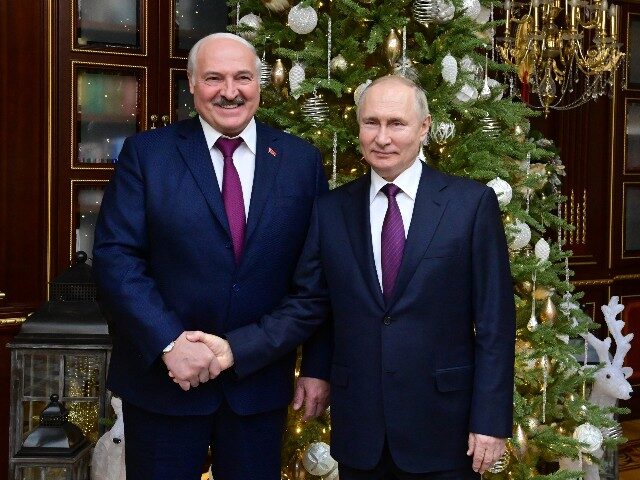Russian President Vladimir Putin made his first visit to Belarus in more than three years on Monday, using one of his few journeys outside Russia since the beginning of the Ukraine invasion to shore up his relationship with Belarusian dictator Alexander Lukashenko and pressure Belarus to pour its own troops into the Ukrainian quagmire.
The left-wing New York Times (NYT) noted that Putin has met with Lukashenko six times since the beginning of the war, always beyond the borders of Belarus until now – and even though Lukashenko relies on money and security support from Moscow to stay in power after almost 30 years, he has thus far been unwilling to contribute more to the Ukraine invasion than allowing Russian forces to stage assaults from his territory.
“In remarks reported by the state news agency Belta, the Belarusian strongman insisted that his meeting with Mr. Putin on Monday would focus on economic matters, particularly the price of Russian natural gas, on which Belarus is heavily dependent,” the NYT reported on Monday, suggesting the sixth time might not be the charm for Putin’s efforts to get Belarusian troops on the Ukrainian ground.
Putin’s visit to Minsk will be closely watched because Russia might not be able to mount a turning-point attack on Ukraine’s capital of Kyiv without more support from Belarus. Putin seems determined to project the image of a hands-on wartime leader organizing a decisive new offensive, rather than hiding in a bunker and licking his wounds after a stalled war effort that proved far more difficult than he anticipated. But without Belarusian manpower, he might not be able to do better than his current campaign of showering Ukrainian civilian targets with rockets and suicide drones, which seems a lot closer to terrorism than a military strategy.
Radio Free Europe (RFE) quoted analysts who doubted Lukashenko would ever be willing to dive head-first into the Ukraine war since his own grip on power is not all that secure and he stands to gain very little by pouring money and manpower into the effort.
Instead, these observers felt Putin’s trip to Minsk, in the company of his defense secretary, Sergei Shoigu, was a ploy to “distract Ukraine’s military leadership and draw its forces away from fierce fighting in the east and toward the border with Belarus in the north.”
The Putin regime emitted mixed signals about Belarus over the weekend, the Kremlin dismissing rumors of Putin drafting Lukashenko into the Ukraine invasion as “groundless” and “stupid unfounded fabrications” while Russian state media excitedly touted upcoming joint military operations with Belarus as a dry run for Minsk to join the attack on Kyiv.
Prior to Putin’s arrival, Lukashenko said the crisis in Ukraine represented an “escalating” threat to Belarusian sovereignty, but he also mocked the idea that “Russians are already walking and running” his country.
“I would like to emphasize this feature once again: no one, except us, governs Belarus. We must always proceed from the fact that we are a sovereign state and independent,” Lukashenko insisted, claiming economic issues were at the top of his agenda for talks with Putin.
Another ominous sign mentioned by Reuters on Monday was the sudden death of Belarusian Foreign Minister Vladimir Makei, one of the few officials in Lukashenko’s regime who had any sort of relationship with Western diplomats.
The death of Makei, 64, was announced by the Foreign Ministry on November 26 with no additional details. Makei previously appeared to be in good health and had no known chronic illnesses. Besides having some contacts in the Western world, Makei was the lone Lukashenko official to survive the purge after Lukashenko “won” the extremely dodgy 2020 presidential election, unleashing a wave of protests that briefly threatened to topple his regime.
Shortly before Makei’s mysterious death, the Carnegie Endowment mused that Belarusian sovereignty would never survive involvement in the Ukraine war because “the underequipped Belarusian army” would suffer heavy casualties. Moscow, which stepped in to crush the 2020 protests and keep Lukashenko in power, would probably take an even heavier hand in such a scenario and absorb Belarus outright, especially if this time Lukashenko was killed or forced out of the country.
Belarusian independence was previously useful to Russia because Belarus rented itself out as a politically acceptable gateway for shipping refined Russian oil to the West. However, the war in Ukraine cut off that export stream, so Russia might now find it more expedient to absorb Belarus and take direct control of its production and refining capacity. All Putin needs to do is pressure Lukashenko into making a military commitment in Ukraine that might lead to turmoil and revolution in Belarus. Lukashenko is widely regarded as too canny to make such a mistake – but on the other hand, it grows increasingly difficult for him to stay on the sidelines while Russia’s war in Ukraine falters.

COMMENTS
Please let us know if you're having issues with commenting.